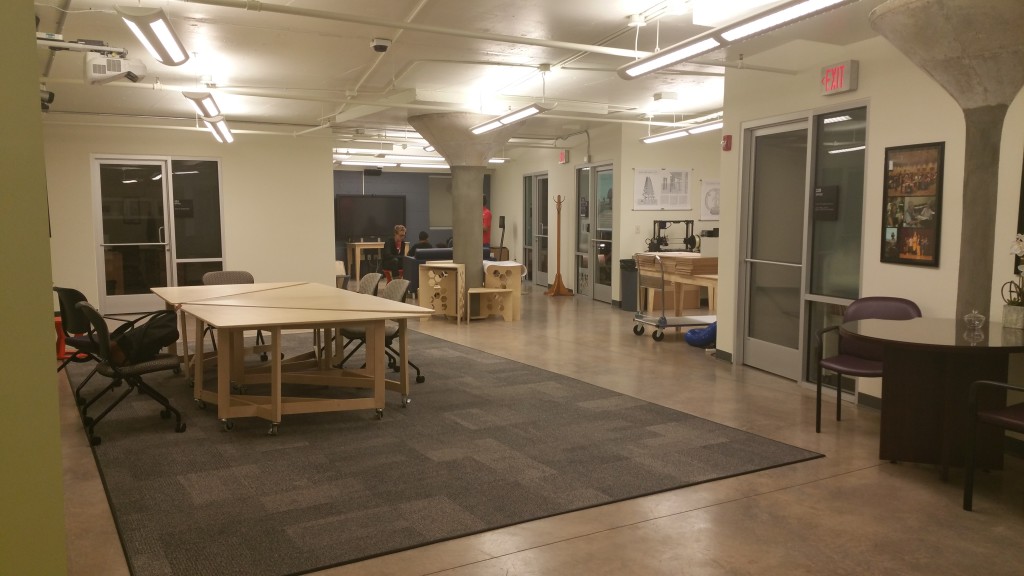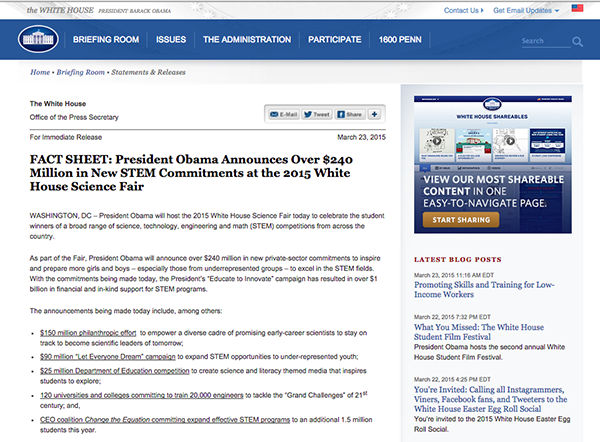Virginia is for Makers*
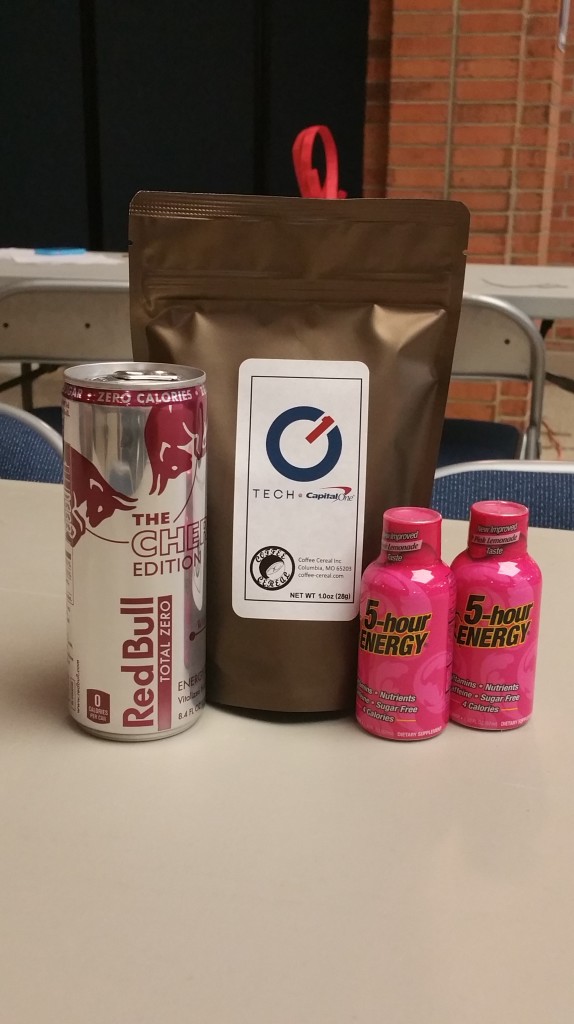 *A play on Virginia’s state motto, “Virginia is for Lovers.”
*A play on Virginia’s state motto, “Virginia is for Lovers.”
We kicked off our roadtrip strong, driving 5 hours through 5 states – MA, CT, NY, NJ, and PA – before stopping in Harrisburg, Pennsylvania to get some Zzzs. Our biggest priority was to get to James Madison University to join their first-ever, student-led 24-hour hackathon, Bluestone Hacks. Participants of the hackathon had started innovating about the time we hit the road Friday night (6 p.m. on Friday, April 17) and were up all night developing their ideas, building working prototypes, and honing their final presentations.
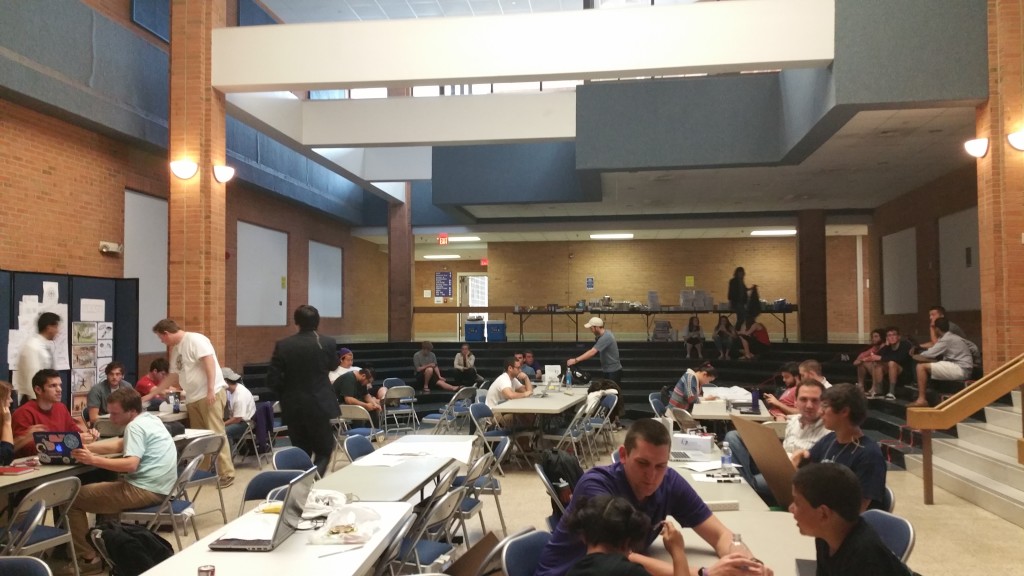
On Saturday, we arrived at Memorial Hall eager to see the students present their ideas in one of three categories: food and agriculture, health and medicine, or consumer goods and products. Humera Fasihuddin (co-lead of the Fellows program) was invited to judge the food and agriculture category. We arrived to an open auditorium with roughly 60 participants and tables covered in prototyping materials, computers, food and red bull. The participants’ 24 hours was up, and it was time to present their final ideas.
 Fourteen teams had formed and had 5 minutes to present with an additional 2 minutes of Q&A from the panel of judges. The teams had developed ideas from aiding local food producers market where they would be selling local produce to gym powered greenhouses to apps organizing medical emergency information to a mobile solution for HR companies on-boarding their new hires. The winner of Bluestone Hacks was Volterre, a mobile app designed to predict epidemics. The software monitors moods, social networks and google searches in a geo-targeted location to identify the spread of sickness in order to avoid epidemics. The winner was a senior at JMU studying physics.
Fourteen teams had formed and had 5 minutes to present with an additional 2 minutes of Q&A from the panel of judges. The teams had developed ideas from aiding local food producers market where they would be selling local produce to gym powered greenhouses to apps organizing medical emergency information to a mobile solution for HR companies on-boarding their new hires. The winner of Bluestone Hacks was Volterre, a mobile app designed to predict epidemics. The software monitors moods, social networks and google searches in a geo-targeted location to identify the spread of sickness in order to avoid epidemics. The winner was a senior at JMU studying physics.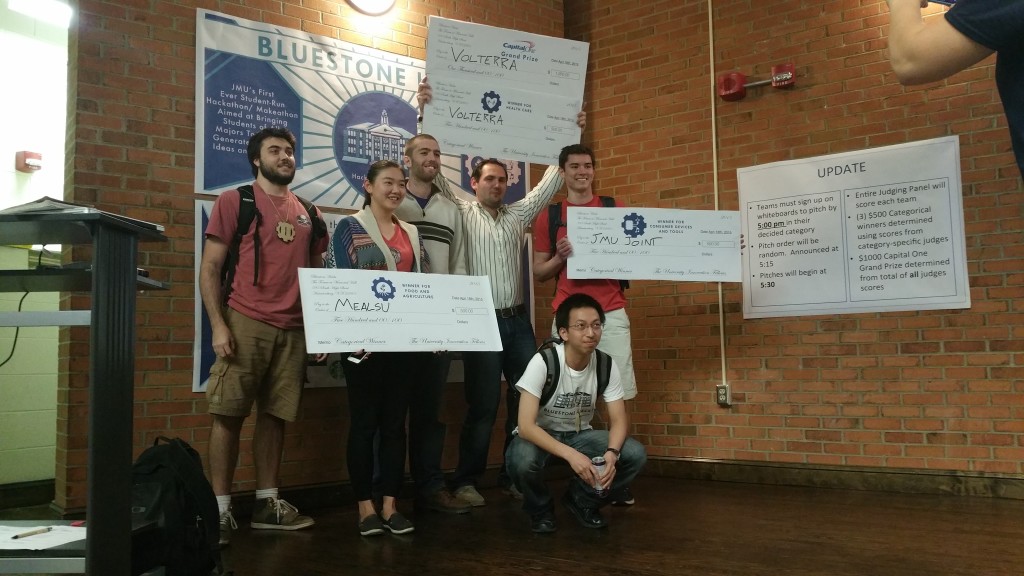
Bluestone Hacks was an amazing event, and the fact that 5 Fellows organized the entire experience in less than one month and raised $8,000 from sponsors in two weeks is highly impressive.
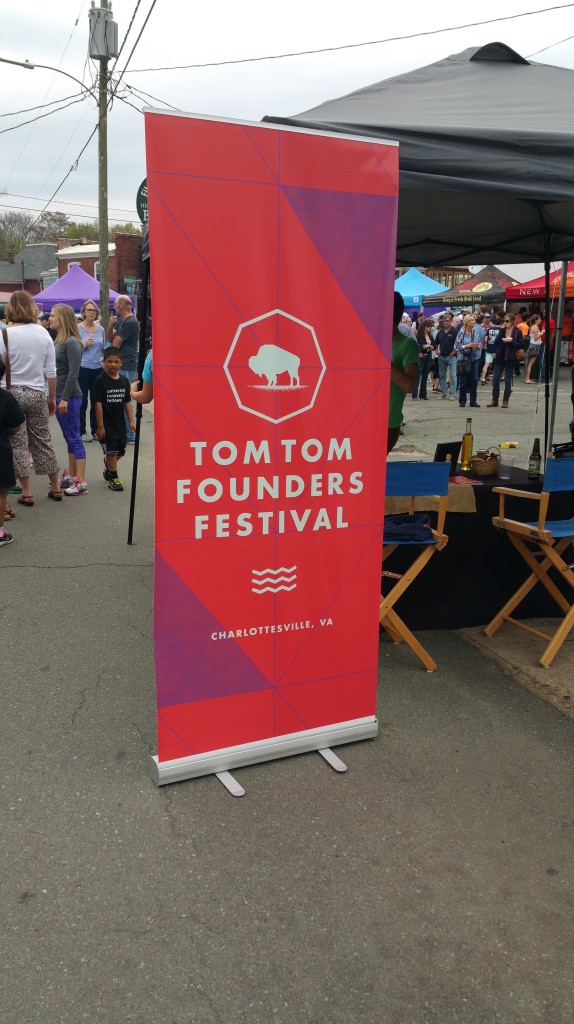 Sunday was an entirely different atmosphere. We took hit the road an hour south to Charlottesville, VA, to meet up with our University of Virginia Fellows and their faculty sponsor, David Chen. After an amazing lunch and tour in beautiful downtown Charlottesville, after which we hit the infamous TomTom Festival. In short, the TomTom festival is a celebration of founders, named after one of our nation’s original founders Thomas Jefferson. A celebration of the startup, creative and innovative talent in Virginia, the TomTom Festival is a two-week shindig incorporating art, music, food and innovation in a fabulous outdoor neighborhood street-fair setting.
Sunday was an entirely different atmosphere. We took hit the road an hour south to Charlottesville, VA, to meet up with our University of Virginia Fellows and their faculty sponsor, David Chen. After an amazing lunch and tour in beautiful downtown Charlottesville, after which we hit the infamous TomTom Festival. In short, the TomTom festival is a celebration of founders, named after one of our nation’s original founders Thomas Jefferson. A celebration of the startup, creative and innovative talent in Virginia, the TomTom Festival is a two-week shindig incorporating art, music, food and innovation in a fabulous outdoor neighborhood street-fair setting.
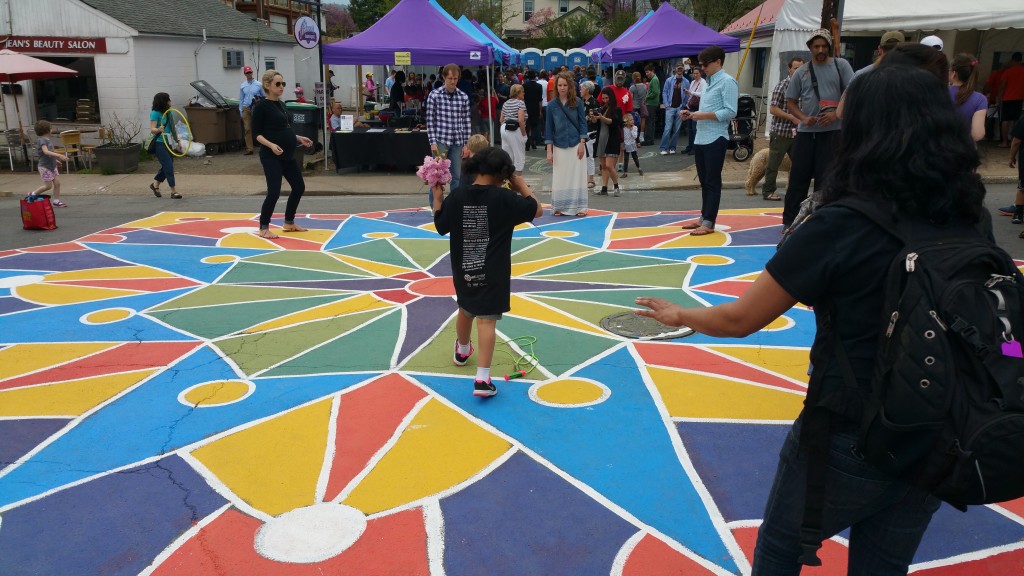
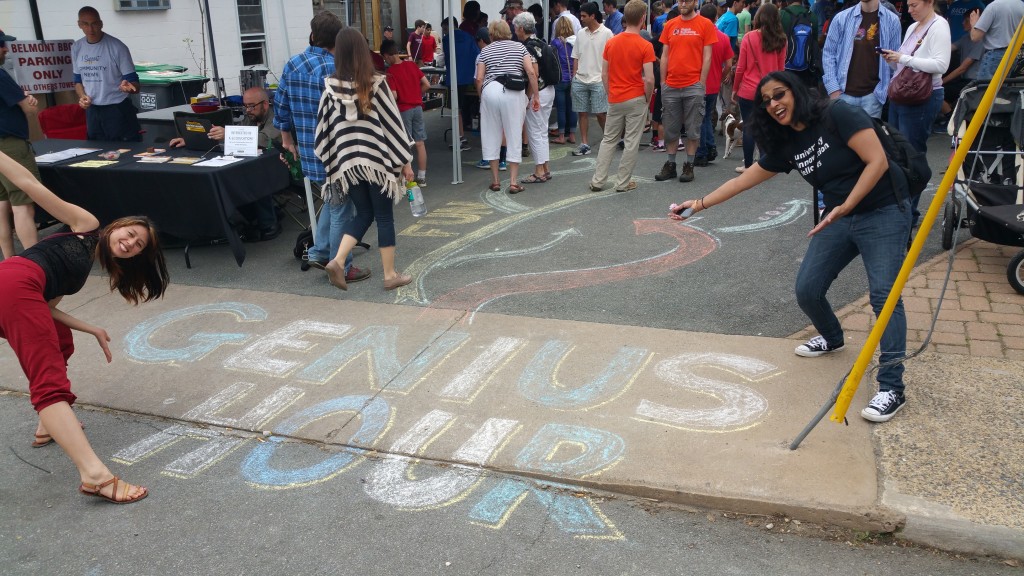 There, we attended the Genius Hour — an event for makers of all ages — and saw many K12 and collegiate-level projects. It was described as “…a celebration of tech enthusiasts, crafters, educators, tinkerers, hobbyists, engineers, artists, and students.” We had the opportunity to meet one of the organizers, Nate, a senior at UVa, who reached out to TomTom Fest organizers and pulled together the community to exhibit their creativity. As a program, we had heard we were making a difference (from both faculty sponsors and Fellows), but we were blown-away as community members recognized our University Innovation Fellows t-shirts at TomTom Fest.
There, we attended the Genius Hour — an event for makers of all ages — and saw many K12 and collegiate-level projects. It was described as “…a celebration of tech enthusiasts, crafters, educators, tinkerers, hobbyists, engineers, artists, and students.” We had the opportunity to meet one of the organizers, Nate, a senior at UVa, who reached out to TomTom Fest organizers and pulled together the community to exhibit their creativity. As a program, we had heard we were making a difference (from both faculty sponsors and Fellows), but we were blown-away as community members recognized our University Innovation Fellows t-shirts at TomTom Fest.
After a wonderful afternoon at UVa, we headed back to JMU to have dinner and tour of the ICE House and ICE Maker House. The ICE House is a hub of resources providing students with access to resources for startups and small businesses, a maker space (ICE Maker House) and iterative learning experiences.
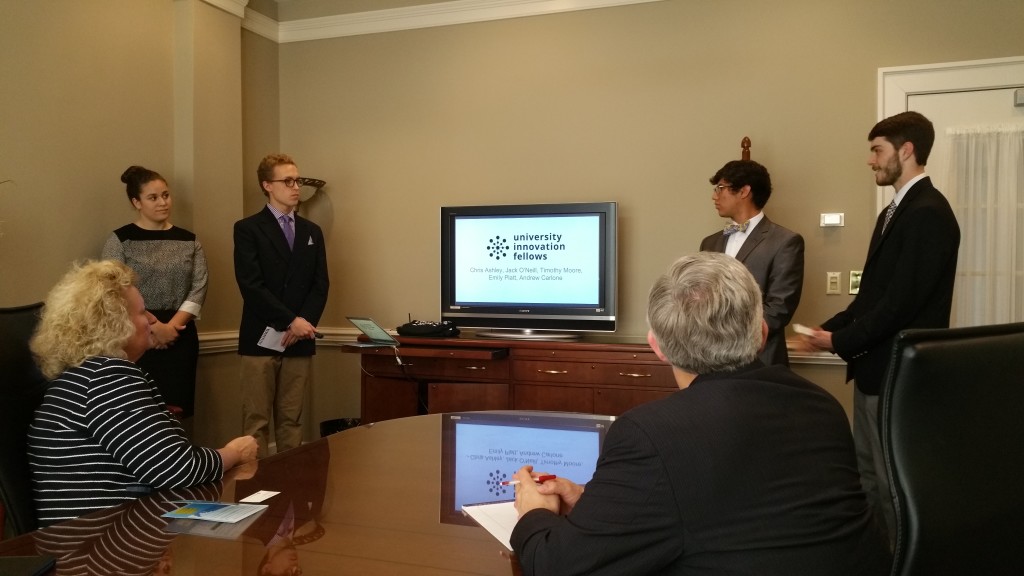
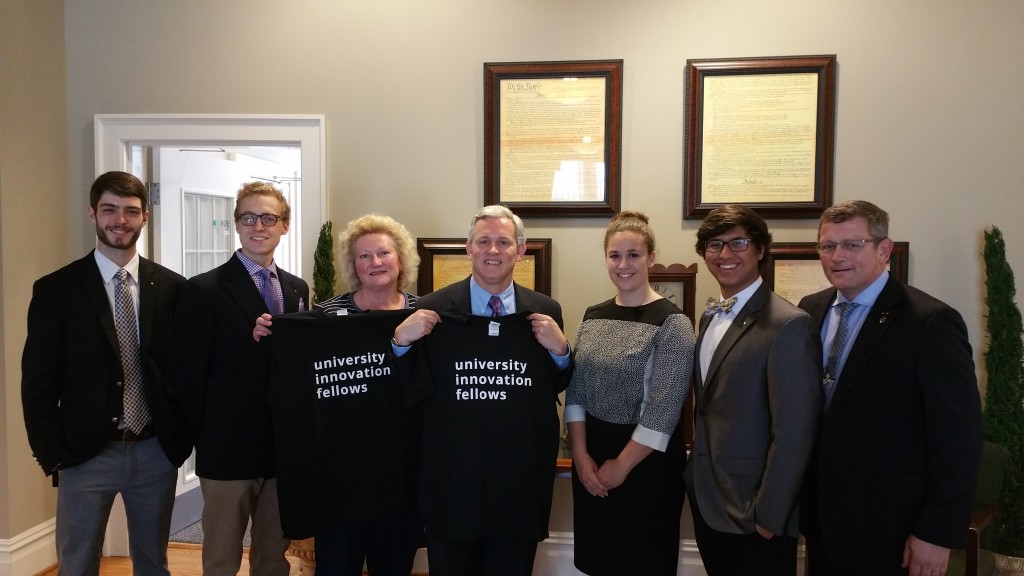
Fast forward to Monday afternoon. Humera and I were invited to attend our first pinning ceremony with the JMU Fellows, their faculty sponsor Nick Swayne, President Jonathan Alger and his wife, Mary Anne Alger. Fellows Chris Ashley, Timothy Moore, Emily Pratt and Jack O’Neil gave an amazing presentation on their work as Fellows. We were extremely proud of their ability to articulate their vision and describe the enhancements they wanted to see on JMU’s campus.
And now, we’re on our way to Kent State University to our Fellows Robin Bonatesta, Sravan Kumar, Tapti Saha and Matthew Allen. We have put nearly 800 miles behind us, with many more to go!
Cheers,
Humera and Katie
Pictured Below: James Madison University Fellows: Chris Ashley, Jack O’Neil, Emily Platt, and Timothy Moore; Nick Swayne, Faculty Sponsor; and Humera & Katie.
Pictured Below: University of Virginia Fellows: Ben Matthews, Angela Liu, Katie Kan, Rachel Smith, Anish Dalal, Dasha Tyshlek; David Chen, Faculty Sponsor, and his beautiful children Sofia and Austin; Katie and Humera, along with Humera’s children Noah, Aliya and Jeremiah.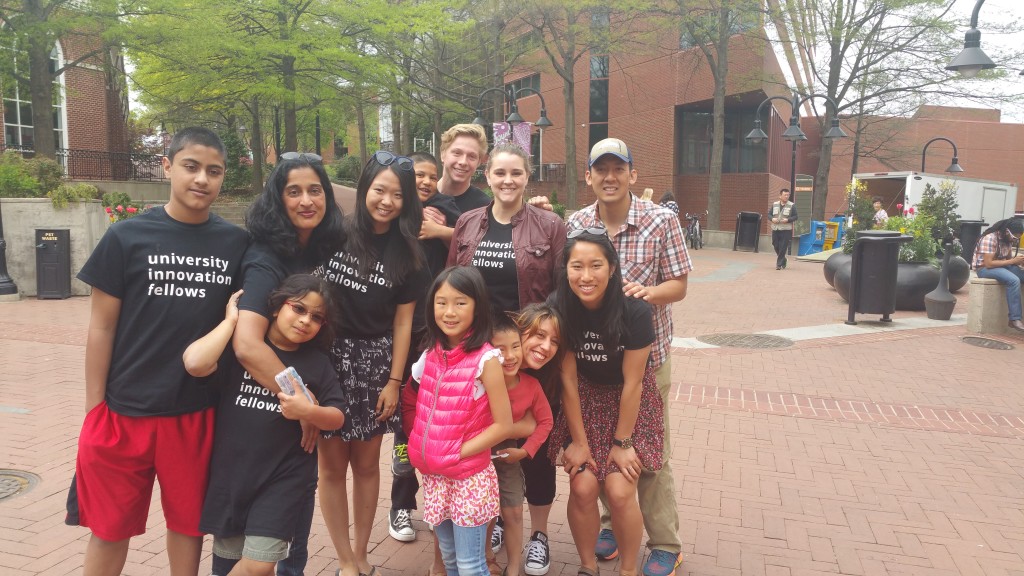
Read all posts in this series here:
Virginia is for Makers

